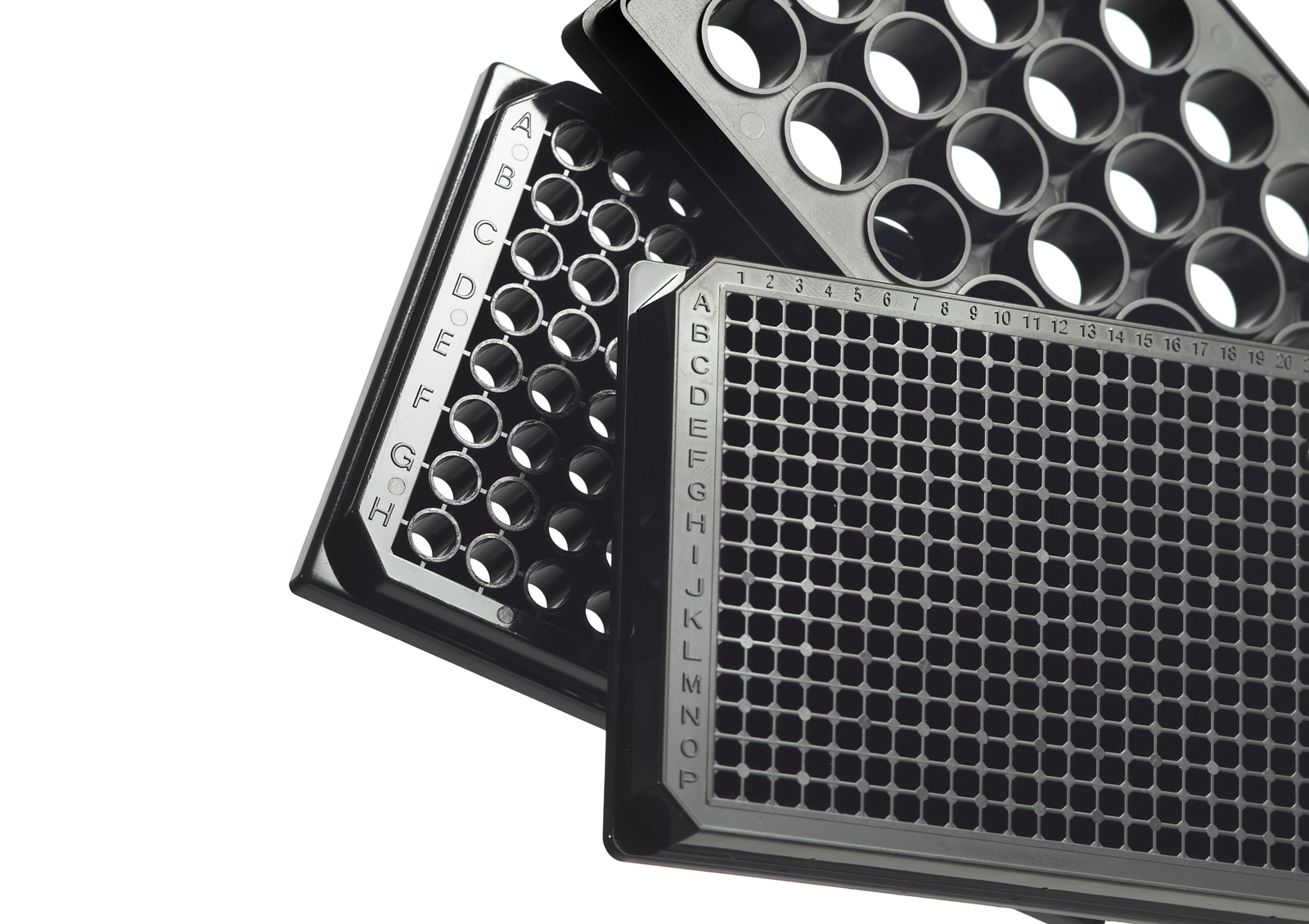VisionPlates™ are our best plates for your most advanced applications. When visualising fluorescent signals from anything between a single molecule to a whole cell, VisionPlates™ will give accurate and consistent results.
Suitable for cell-bases high content screening (HCS), conical microscopy, FRET and homogeneous assays, results show an optimum signal-to-noise ratio and a high consistency essential for automated high throughput.
Using state of the art technology 4titude® have developed a product which offers key advantages to the end user.
See Full Range Request a Sample Vision Plate™ Flyer
Optical Quality of the Polymer Film
The clear base component of our VisionPlate™ microplates demonstrates superior properties in terms of optical clarity (low absorbency and high transmission), low background fluorescence and consistency of material thickness.
The latest extrusion technology is used for manufacturing an ultra-clear base of 190 µm in thickness to provide optimum results with confocal microscopy and laser based detection systems.
Variation across the plate is minimised, so the time needed for complex screening applications can be reduced dramatically.

 Graph to show the intensity of autofluorescence of 4titude®'s VisionPlate™ compared to leading brand competitors A, B & C
Graph to show the intensity of autofluorescence of 4titude®'s VisionPlate™ compared to leading brand competitors A, B & C
Reduction of Auofluorescence
4titude®’s VisionPlates™ are assembled using unique patented laser welding technology which reduces autofluorescence and does not inhibit cell growth. other competitors assemble clear base microplates by gluing a clear film to the frame or heat-welding the components together. Both techniques can cause problems with cell growth and the subsequent microscopic or fluorometric analysis.
Heat welding of the two plate components under high pressure results in autofluorescence at the well edges called “halo effect”. Gluing uses organic solvents within the adhesives, which can also cause autofluorescence. These solvents can also have cytotoxic effects, which may lead to inhibition of cell growth or even cell death. Additionally, incomplete glue lines or weld lines often result in well-to-well leakage.
Improved Cell Adhesion
Polymers such as polystyrene are very hydrophobic and need to be surface treated to increase wettability and to allow for cell adhesion. To introduce the necessary charges to the plastic surface screening plates are commonly undergoing corona treatment or similar low cost modifications. The drawbacks of such treatments are that they are partly reversible and that the density of the charges varies across the surface area, resulting in uneven cell growth and a short shelf life of the products.
4titude® uses a unique low pressure plasma process for treating the plastic surface which produces a more consistent and stable surface. The treatment has been especially designed to improve cell adhesion under difficult conditions (e.g. reduced serum conditions). It is also useful for growing cells with low adhesion properties such as transfected cells over-expressing proteins.
Comparison showing the cell adherence of the 4titude® VisionPlate™ (top) versus a competitor's (bottom)


2000 cells were seeded in each well and incubated for 48 hours to achieve 90% confluency. They were then fixed in PFA and stained with Hoechst nuclear stain, followed by 5 wash steps in PW384. U2-OS stayed adherent in both plates, but the more sensitive HeLa and HuH cells only stayed adherent in all areas of the 4titude® VisionPlate™.
Pictures shown of light microscope image.
4titude® offers coatings with Collagen 1 or Poly-D-lysine.
Collagen 1
Collagen 1 is a protein of the extracellular matrix (ECM), an intercellular substance, which in vivo, influences adhesion, migration and proliferation among other processes. Collagen 1 is one of the most important ECM proteins for in-vitro cell cultures. Difficult to cultivate cells adhere to Collagen 1 and display positive growth. Collagen 1 can also influence differentiation and morphology.
Poly-D-lysine
Poly-D-lysine is a synthetic molecule that improves the adhesion of different cell types to polystyrene surfaces. It can improve cultivation efficiency of individual cell lines especially when serum-free or serum-reduced medium is used, or when experiments such as transfections are performed.


